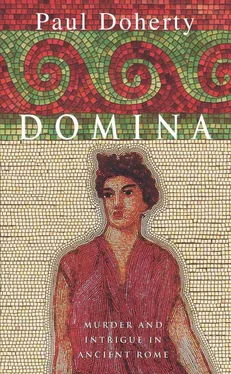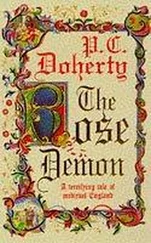Paul Doherty - Domina
Здесь есть возможность читать онлайн «Paul Doherty - Domina» весь текст электронной книги совершенно бесплатно (целиком полную версию без сокращений). В некоторых случаях можно слушать аудио, скачать через торрент в формате fb2 и присутствует краткое содержание. Год выпуска: 2012, ISBN: 2012, Издательство: Headline, Жанр: Исторический детектив, на английском языке. Описание произведения, (предисловие) а так же отзывы посетителей доступны на портале библиотеки ЛибКат.
- Название:Domina
- Автор:
- Издательство:Headline
- Жанр:
- Год:2012
- ISBN:9780755350490
- Рейтинг книги:3 / 5. Голосов: 1
-
Избранное:Добавить в избранное
- Отзывы:
-
Ваша оценка:
- 60
- 1
- 2
- 3
- 4
- 5
Domina: краткое содержание, описание и аннотация
Предлагаем к чтению аннотацию, описание, краткое содержание или предисловие (зависит от того, что написал сам автор книги «Domina»). Если вы не нашли необходимую информацию о книге — напишите в комментариях, мы постараемся отыскать её.
Domina — читать онлайн бесплатно полную книгу (весь текст) целиком
Ниже представлен текст книги, разбитый по страницам. Система сохранения места последней прочитанной страницы, позволяет с удобством читать онлайн бесплатно книгу «Domina», без необходимости каждый раз заново искать на чём Вы остановились. Поставьте закладку, и сможете в любой момент перейти на страницу, на которой закончили чтение.
Интервал:
Закладка:
‘And?’ I demanded. ‘There is something else?’
‘Cassius has brought a pass. You can return to Rome for the winter. I think Caligula wants to find out how his sister is faring. When Cassius leaves, you are to go with him.’
‘To plot, be caught and executed!’ I exclaimed.
‘No, listen.’
Agrippina gripped my wrist, a sign that she was going to impart something important. It always made me shiver, reminding me how Charicles used to take Tiberius’s pulse.
‘Caligula will die,’ Agrippina insisted. ‘And who is there left? Those doddering fools in the Senate may try and restore the Republic but the army won’t allow that.’
‘Your Uncle Claudius?’ I replied.
‘Precisely.’ Agrippina squeezed my wrist even tighter. ‘If Caligula dies suddenly, there’ll be confusion. You and Cassius must ensure that Claudius is hailed as Emperor. He’ll bring me back to Rome.’
Agrippina dropped my wrist. ‘Whatever happens, Parmenon, you must ensure that, somehow, Claudius is brought forward. Naturally, in the chaos following Caligula’s death, my son must be closely protected.’ She got to her feet and pulled me up. ‘By the way, I know you’ve got too tender a heart so Cassius will do this for me — ensure that Caligula’s wife Caesonia and her little brat don’t survive any longer than he does. Now, come! I am sure Cassius is already pining for me and we’ve got preparations to make.’
Chapter 10
‘Chaos: an ill-formed and unordered Mass.’
Ovid, Metamorphoses: 1, 7It was good to be back in Rome. Despite the winter, the taverns were crowded as usual. After the silence of Pontia, I enjoyed walking through the different quarters watching the barbers shave their customers in the middle of the street, the loud-mouthed hawkers selling their small boxes of sulphur matches and trinkets, the raucous cries of the sausage-sellers with their makeshift mobile ovens. Schoolmasters, ringed by their pupils in a small, dirty square, shouted themselves hoarse. Nearby, a money-changer sifted his coins in a metal grille whilst his assistant pounded with a shiny mallet on clipped and chipped coins. Conjurors and tricksters swarmed everywhere, competing with the beggars. The sheer frenetic bustle of their lives was a sharp contrast to the horrors of Caligula’s court or Agrippina’s seething anger as she plotted her return.
I lodged with Cassius Chaerea in the Praetorian barracks near the Viminial Gate. Of course, I had to be presented to the Emperor, and was obliged to attend one of his famous supper parties in Livia’s old palace. Caligula was, as usual, lounging on a couch. He seemed taller and thinner, his face had assumed a skull-like look, hollow-eyed and sunken-cheeked. He was nearly bald except for an incongruous tuft of hair which rested on the nape of his neck. He looked me up and down. I was obliged to kneel and kiss his slippered foot.
‘How is my darling sister?’ he lisped. ‘I often think of her.’ He repeated his ominous threat, ‘And, when you return, Parmenon, remind her I have daggers as well as islands!’
Chaerea had informed me that Caligula had banished many of his enemies and, on a mere whim, sent executioners to hunt them down and forced them to take their own lives. If they refused, they were cruelly butchered.
‘Well, get up! Get up!’ Caligula waved his hand airily. ‘I have to retire.’
I took my place on the couches which were arranged in a horseshoe around the Emperor’s which stood on a raised dais. The mood was one of sheer terror. No one dared eat without the Emperor’s permission and everyone was petrified of catching his eye. The Emperor withdrew, and when he returned, he was dressed as a woman in a beautiful silk gown, with a veil over his balding head. He wore artificial green finger- and toenails. He didn’t take a seat but clapped his hands and the musicians struck up the tune of a well-known Syracusan dance. The Gods be my witness, we had to sit and watch as the Emperor of Rome danced and cavorted as if he were a tumbler from Antioch. Of course, at the end, the applause was deafening. Caligula, still in his female clothes, returned to his couch, sharing it with an actor who was under strict instructions to treat the Emperor as if he was a woman.
I was forced to remain in court for the next few days. The Emperor lived in a world of his own. He often made public appearances in a woman’s cloak covered with embroidery and precious stones. Or, in sharp contrast, he’d wear the famous military boots which gave him his nick-name. He had an artificial golden beard which he would fasten to his face and carry a thunder-bolt trident or serpentine staff as he pretended to be Jupiter or Apollo. On occasions he’d disport himself as Venus, which was truly dangerous: with his bony shoulders and spindly legs, it was difficult not to laugh out loud.
Caligula’s only link with sanity seemed to be his love of chariot racing but even here his madness had eventually manifested itself. He fell in love with his own horse Incitatus and built him a marble stable with an ivory stall, purple blankets and jewelled harness. Before a race the entire neighbourhood around the imperial stable was put under armed guard, and sentence of death was passed on anyone who disturbed his horse. The charioteers were divided into different factions, with an intense rivalry between the ‘Blues’ and ‘Greens’. Caligula supported the ‘Greens’. Woe betide any charioteer from an opposing faction who threatened the Emperor’s favourites — they could expect either themselves, or their horses, to be poisoned. No wonder Rome seethed with unrest.
At first I was left alone by the conspirators. Caligula had me watched but, as the New Year came and went, dismissed me as a nonentity; he was more interested in the games and festivities planned for the end of the month. I was left to my own devices. I went out to the Via Sacre and visited the baby Nero. He was, as Agrippina had described him, a bouncing, unruly, little boy with bulbous blue eyes and a shock of red-coppery hair. Even then he was a born actor. I had to sit with his guardians while the little fellow sang and danced. I don’t believe in premonitions, yet, as I watched the child, I kept thinking of the monster on the Palatine. For the first time in my life, I quietly prayed that Agrippina had chosen the right course for her son. The aged aunt who looked after the boy was a cold, austere, old woman with a face like vinegar.
Never once, she proudly informed me, had she reminded the boy of his mother.
I smiled thinly and assured her that Agrippina would never forget such a remark. I also called on Uncle Claudius in the library of the Senate house. His twisted face was unshaven, his tunic and toga soiled with dust and ink. He walked me up and down the rows of shelves, dragging his foot behind him, whilst delivering a lecture on the possible ancestors of the Divine Augustus. Round and round we went until I became dizzy. In a shadowy, dusty corner, he abruptly paused and sat down on a stool, mopping his face with the rag he kept up his sleeve.
‘Are you part of it?’ he asked. His eyes had lost that empty, vacuous look. His mouth was no longer slack, the jaw line seemed firmer, his voice free of any impediment. He spoke clearly and distinctly whilst those shrewd grey-green eyes studied me.
‘So, you are Agrippina’s man?’ he asked.
‘I am.’
He puckered his lower lip. ‘And are you one of them?’ he repeated.
‘One of what, sir?’ I asked.
‘You know full well,’ he teased. ‘Caligula is going to die, isn’t he? He’s obscene. He’s mad and his wickedness grows every day. At the moment, he’s absorbed in his games but soon he’ll lash out once more and his kin will feel his wrath. The signs are all there. The portents. .’
Читать дальшеИнтервал:
Закладка:
Похожие книги на «Domina»
Представляем Вашему вниманию похожие книги на «Domina» списком для выбора. Мы отобрали схожую по названию и смыслу литературу в надежде предоставить читателям больше вариантов отыскать новые, интересные, ещё непрочитанные произведения.
Обсуждение, отзывы о книге «Domina» и просто собственные мнения читателей. Оставьте ваши комментарии, напишите, что Вы думаете о произведении, его смысле или главных героях. Укажите что конкретно понравилось, а что нет, и почему Вы так считаете.












